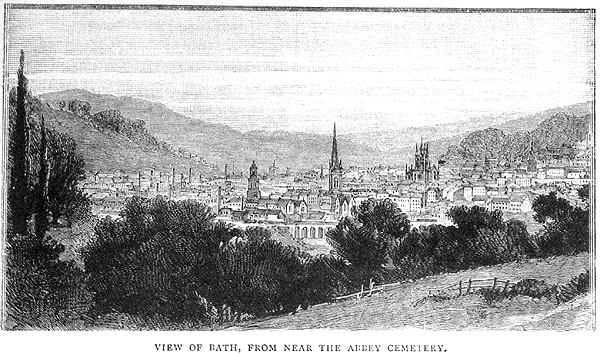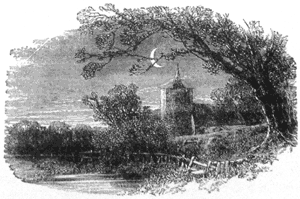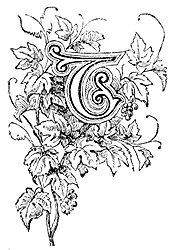Bath is situated in an amphitheatre of hills, and takes its name from the hot medicinal springs to which tradition says it owes its foundation. The tale of the discovery of the curative power of the waters is probably well known. Bladud, the son of the ancient British king Lud Hudibras, became a leper. The awful disease of course unfitted him in the eyes of his family and people from inheriting the throne; he was banished from the palace, and had to seek a home and food to live. His dress, which was royal, he offered to a swineherd, with the little money he possessed, in exchange for his peasant's garb, and induced the boy's master to let him herd his pigs, that fed in the great forest which covered the Somersetshire hills at that period. As a natural consequence he infected the pigs with his disease; and became very miserable at the thought that when the owner of the swine came to inspect them he would be at once discharged. He was walking behind the herd of swine in sad thought one day, when they all ran down the hill and plunged into a sheet of water in a hollow of the woods. He noticed that they constantly repeated these baths, and that in a few weeks the leprosy had left them. Taking example by their instinct he plunged himself into the water, which was quite hot, and in a very short time was healed of his leprosy. The lad then resolved to return to his family. He found a great
feast going on at the palace - every one was gay and happy - all had forgotten
their young prince's fate, except one; his mother sat with a sad, faraway
expression in her eyes beside the king. Bladud had drawn the hood of his
cloak over his face, so as to conceal it. He had kept a ring the queen had
given him: he now stole forward and, unperceived, dropped it into the goblet
from which she drank. The next time she raised the cup to her lips the ring
fell against them. She took it out, looked at it, and exclaimed, "Our son
is here." Bladud then came forward, was recognised; was found quite free
from leprosy; and in time succeeded his father on the throne. The legend
adds, that he built a town round the healing waters that had saved him from
a cruel death, in commemoration of what they had done for him, and also for
the benefit of his people. But in spite of this tradition it is believed
that Bath was a Roman city, though probably the Britons may have had a settlement
there, and knew the value of the waters. 
That it was a Roman city of some iniportance is proved by the quantity of Roman remains, the altars with inscriptions, the tessellated pavements, urns, vases, coins that have been found or disinterred in the country round Bath and in the city. The Romans were extremely fond of hot baths, and therefore would have preferred the warm hill-sheltered situation, and the waters always warm, to any other place in Britain. It was, doubtless, one of their chief stations. A community of monks existed here from the earliest times of Christianity; and the abbey was built by King Offa, of Mercia, in 775, and refounded by King Edgar. In the insurrection of Odo, Bishop of Bayeux, against William Rufus, both the town and abbey were burned and destroyed. And then a strange thing occurred. A monk of Tours actually bought the ruined city of Bath from Rufus for the sum of 500 marks! His name was John de Villula. Like many of the Churchmen at that time he was a skilful physician, though probably not of the profession of leechcraft, as he is called by the historian Warner a quack. He lived in Bath, where he had made a large fortune by healing the invalids who came for the waters. He could not have belonged to an order vowed to poverty. It was doubtless with great regret that this intelligent man saw the beautiful Roman city where he had lived and toiled, reduced to ruins. As we have seen, he bought it of Rufus, and then he set himself the task of restoring it. By his liberality and wonderful power of organising he achieved this great work. He restored its chief edifices, and the church and monastery. He then resolved to get the See of Wells removed to Bath, and he succeeded in this also. Henry I. was capable of appreciating the talents and patriotism of Villula-and we are inclined to think that Matthew Paris may have been mistaken when he wrote that Villula had "anointed the king's hand with white ointment," i.e. bribed him. Henry Beauclerc was able to comprehend the great aims and public spirit of the wealthy monk; he confirmed all the existing privileges of the city, and added new; and in 1106 Villula - the first Bishop of Bath - gave the whole of his possessions with wonderful generosity to the monastery, reserving to himself and his successors in the see only the right of appointing the prior, who was to rule the new priory. Bath Cathedral was founded by Lishop Oliver King in the reign of Henry VII. "Lying at Bath," we are told, "and musing, or meditating one night late, after his devotions and prayers for the prosperity of Henry VII. and his children (who were all in most part living), to which king he was principal secretary, and by him preferred to his bishopric, he saw (or believed he saw) a vision of the Holy Trinity, with angels ascending and descending by a ladder, near to the foot of which there was a fair olive tree supporting a crown, and a voice that said, 'Let an Olive establish the Crown, and let a King restore the Church.' 1 He interpreted this dream as calling on him to restore the Church, for Olive answered to his Christian name, Oliver, and King to his family name. Most certain it is," Harrington continues, "he was so transported with his dream for the time, that he presently set in hand with the church (the ruins whereof I rue to behold even in writing these lines), and at the west end thereof he caused a representation to be graved of this his vision of the Trinity, the angels, and the ladder; and on the north side the olive and crown, with certain French words, which I could not read, but in English is the verse taken out of the Book of Judges, chap. ix. :- The window to which Harrington refers is, at the present day, one of the glories of the cathedral; it represents the dream which led to the re-erection of the building. But Bishop King died and left his work unfinished, and the Reformation arrested all architectural ecclesiastic work, and in Harrington's time the church, which had become dilapidated, lay in a ruinous state. Harrington was the favourite godson of Elizabeth, and a poet; his fancy had probably been caught by Bishop King's dream, and he resolved to try if he could get the church restored and completed. An opportunity soon came for him to make an effort in its behalf. Bishop Montague, at Bath, on his Visitation, was caught in a shower when walking with him in a grove near the ruins. Sir John Harrington advised him to take shelter in the church, and led him into the north aisle, which was roofless. The bishop observed that it did not shelter him from the rain. "Doth it not, my lord ?" said Harrington; "then let me sue your bounty toward covering our poor church; for if it keep not us safe from the water above, how shall it ever save others from the fire beneath? " The bishop accepted the appeal very kindly. It was his first visitation, and therefore it could not be looked on as a reproof. He at once resumed Oliver Kim's work, and nearly completed the
cathedral, which was finished in the reign of James I. At first it was a
noble building, light and elegant, and was called the Lantern of England;
but so-called improvement has taken from it all claim to the picturesque. 
|
||||
